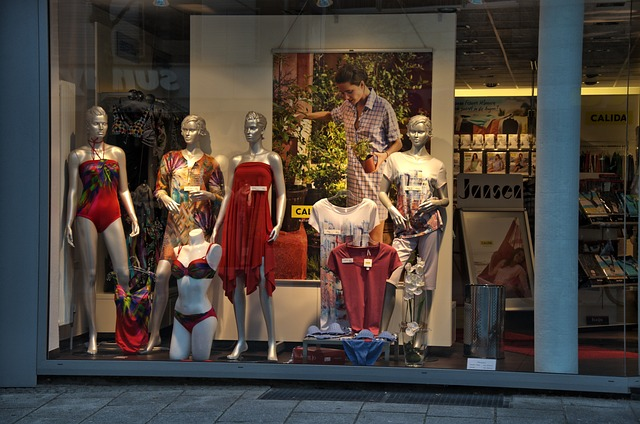What is a Clothing Boutique?
A clothing boutique is a specialized retail operation that offers customers a carefully curated selection of clothing, accessories, and merchandise. Boutique owners take pride in selecting unique brands, designers, and new collections to provide a distinctive shopping experience.
These boutique owners pay close attention to detail, ensuring their products align with their target market’s preferences. By handpicking each item, they create an atmosphere of exclusivity and style within their boutique. This personalized approach sets them apart from traditional retail stores.
In contrast to larger retail chains, clothing boutiques prioritize customer service and individualized attention. They often offer limited quantities of items to maintain a sense of exclusivity for their clientele. This focus on creating a one-of-a-kind shopping experience fosters customer loyalty and satisfaction.
Online boutiques have revolutionized the clothing industry, allowing small businesses to reach a global audience through their eCommerce websites. These online platforms enable boutique owners to showcase their products beyond their local market, significantly expanding their reach and customer base.
What permits or licenses do I need to Start a Clothing Boutique?
Here’s a list of the types of licenses or permits that may be required when starting a clothing boutique. The exact requirements will vary depending on your state, municipality, and business structure.
Business License
To start a clothing boutique, you must obtain a business license from your local government. This license is necessary to operate your boutique and ensure legal compliance with regulations.
You’ll likely file business registration with the state’s Office of the Secretary of State or a similar government entity. When applying, you’ll select your business structure, which could be:
- Sole Proprietorship.
- Partnership.
- Limited Liability Company (LLC).
- Corporation.
- S Corporation.
Retail Sales Permit
You might need to obtain a retail sales permit. This permit allows you to sell clothing items and collect sales tax from customers legally. Contact your local government or licensing agency to apply for the permit and ensure that you comply with all regulations and requirements for operating a retail business.
Employer Identification Number (EIN)
You can easily apply for an EIN for a clothing boutique online through the IRS website by filling out the necessary form. Once submitted, you will receive your EIN immediately, allowing you to operate your boutique and handle tax-related matters legally.
Sales Tax Permit
When opening a clothing boutique, obtaining a sales tax permit is essential to collect sales tax from customers. Depending on local government regulations, the sales tax permit may be included with a retail permit or must be obtained separately. Researching and complying with all necessary permits and regulations to operate the boutique legally and avoid any potential penalties is essential.
Zoning Permit (if applicable)
Acquiring a zoning permit is essential when opening a clothing boutique to ensure the business complies with local regulations and operates in a suitable location. Zoning permits are necessary to confirm that the company is located in an area designated for commercial use and that it meets all safety and environmental requirements.
Without a zoning permit, the clothing boutique may face fines or even closure. To avoid any legal issues down the line, it is crucial to check with local authorities to determine if a zoning permit is required before opening the boutique.
Sign Permit (if applicable)
When opening a clothing boutique, it is essential to check with your local zoning department to see if a sign permit is required. This permit will ensure that your store’s signage complies with local regulations regarding size, placement, and design. Be sure to submit the necessary paperwork and fees to obtain the permit before installing any signage for your boutique.
What are the steps to Starting a Clothing Boutique?
Here’s a step-by-step guide to starting a clothing boutique.
Research the Market
Before starting a clothing boutique, it’s essential to research the market to understand the latest trends, target audience, and competitors. This will help you identify your niche and develop a unique selling proposition.
Create a Business Plan
A detailed business plan will outline your business goals, target market, budget, marketing strategies, and operational plan. This plan will serve as a roadmap for your boutique and help you stay focused on your objectives.
Choose a Location
Selecting the right location for your clothing boutique is crucial for its success. When choosing a storefront, consider factors such as foot traffic, visibility, parking availability, and proximity to your target market.
Source Inventory
Find reliable suppliers or manufacturers to source your clothing inventory. Curate a collection that aligns with your target market’s preferences and budget.
Set Up an Online Presence
In today’s digital age, having an online presence is essential for any retail business. Consider creating a website or online store to showcase your products and reach a wider audience.
Obtain Necessary Permits and Licenses
You must obtain all the necessary permits and licenses to operate a clothing boutique in your area. This includes registering your business, obtaining a sales tax permit, and complying with zoning regulations.
Design Your Store
Create an inviting and visually appealing store layout that reflects your brand identity and attracts customers. Consider factors such as lighting, decor, signage, and display racks to enhance the shopping experience.
Develop a Marketing Strategy
Promote your clothing boutique through various marketing channels such as social media, email marketing, influencer collaborations, and local events. Build brand awareness and attract customers through strategic marketing efforts.
Hire Staff
As your boutique grows, consider hiring staff to help with day-to-day operations such as sales, customer service, and inventory management. Make sure to train your employees to provide excellent customer service and represent your brand effectively.
Monitor Performance
Track sales metrics, customer feedback, and inventory turnover to identify areas for improvement and growth. Regularly analyzing these key indicators can help the boutique make informed decisions to optimize operations and enhance customer satisfaction.
What are the pros and cons of Starting a Clothing Boutique?
As a boutique owner, you have the freedom to curate your collection, select unique pieces, and create a distinct brand identity. This creative control allows you to cater to a specific niche market or target audience, setting your boutique apart from larger retailers.
Owning a clothing boutique can be a rewarding experience, as you get to interact with customers, build relationships, and see firsthand your store’s impact on their style and confidence. Starting a clothing boutique can be a fulfilling and exciting venture for those passionate about fashion and retail.
However, starting a clothing boutique can be challenging due to various disadvantages. One major drawback is the high level of competition in the fashion industry, which makes it difficult for new boutiques to stand out and attract customers.
Additionally, the initial investment required to start a boutique can be substantial, including inventory, marketing, and store space costs. Managing inventory levels and predicting trends accurately can also be a significant challenge, leading to potential losses if items do not sell as expected.
Lastly, the fast-paced nature of the fashion industry means that boutique owners must constantly stay updated on trends and adjust their inventory accordingly, adding to the complexity of running a successful boutique.
Starting a Clothing Boutique Pros & Cons
Pros:
- Creative freedom to curate a unique collection of clothing and accessories.
- Opportunity to build a strong brand identity and loyal customer base.
- Potential for high profit margins on boutique items.
- Ability to offer personalized customer service and shopping experience.
- Flexibility in choosing inventory and adapting to fashion trends.
Cons:
- High initial investment required for inventory, storefront, and marketing.
- Intense competition from online retailers and larger chain stores.
- Risk of slow sales and inventory turnover, leading to financial losses.
- Long hours and hard work needed to establish and maintain the boutique.
- Limited scalability compared to online businesses due to physical location constraints.
How can I get funding for my Clothing Boutique business?
Starting a clothing boutique often requires a significant investment. Here are some strategies to gain the necessary startup capital.
Personal Savings
Using personal savings to start a clothing boutique can be a viable option for entrepreneurs looking to fund their business. You can avoid taking out loans or accumulating debt by utilizing funds you have saved up over time.
Some individuals may use their retirement savings as a Rollover for Business Startups (ROBS) to finance their clothing boutique. This involves rolling over funds from a 401(k) or another retirement account into a new business entity, allowing you to invest in your entrepreneurial venture without incurring early withdrawal penalties.
However, it would be best to exercise caution when using personal funds and keep business and personal finances separate.
Investors
Bringing in investors to start a clothing boutique can be a smart move for those looking to launch a successful business. Investors can provide the necessary capital to secure a prime location, purchase inventory, and fund marketing efforts.
In exchange, investors typically receive a percentage of ownership in the business and potential profits. Finding the right investors who share your vision for the boutique and are willing to support your growth can be vital to building a thriving clothing brand. Collaborating with investors can also bring valuable expertise and connections to the table, helping to navigate the competitive fashion industry and stand out in the market.
Business Grants
Another option to consider is applying for business grants specifically designed to support small businesses in the fashion industry. These grants can provide the financial assistance needed to cover startup costs such as inventory, marketing, and rent.
To increase your chances of success, thoroughly research grant opportunities, carefully review eligibility requirements and submit a well-crafted application outlining your business plan and goals. With the right grant funding, you can make your dream of owning a clothing boutique a reality.
Business Loans
To start a clothing boutique, entrepreneurs can explore options like business loans from banks or online lenders to secure the necessary funds for inventory, marketing, and store setup. It’s essential to have a solid business plan and financial projections in place to increase the chances of approval for the loan and ensure successful operations of the boutique in the long run.
However, most commercial lenders do not offer startup business loans. While some options exist, you can also use a business loan to grow and expand your operation once your business credit is established.
Friends & Family
When starting a clothing boutique, some entrepreneurs may choose to borrow money from family members to help with initial costs. While this can be a convenient way to secure funding without high interest rates, it’s essential to establish clear terms and repayment plans to avoid any potential strain on relationships. Open communication and transparency are key when borrowing money from family to ensure a successful start to your business venture.
Crowdfunding
Crowdfunding can be a great way to finance starting a clothing boutique. It allows you to raise funds from many people who believe in your vision. Through platforms like Kickstarter or Indiegogo, you can showcase your unique designs and attract backers passionate about supporting independent businesses.
Frequently Asked Questions
Here are the most common questions about how to start a clothing boutique.
How much does starting a Clothing Boutique cost?
The average startup costs for a clothing boutique can vary depending on factors such as location, size of the store, and inventory selection. On average, however, entrepreneurs can expect to invest anywhere from $50,000 to $150,000 to start a clothing boutique.
This budget typically includes expenses such as leasing a retail space, purchasing inventory, marketing and advertising, hiring staff, and setting up the necessary infrastructure like point-of-sale systems and furniture. It’s crucial for aspiring boutique owners to carefully plan and budget for these costs to ensure a successful launch and sustainable growth.
Is it better to buy an existing Clothing Boutique or start one from scratch?
Deciding whether to buy an existing boutique or begin from scratch can be challenging. Here are the pros and cons of each option to help you make an informed decision.
Starting from Scratch
When starting from scratch, you can create your unique brand identity and vision. You can handpick your location, decor, and inventory tailored to your target market. However, starting from scratch requires more time and effort to establish your presence in the market. It involves building brand recognition and attracting customers from the ground up.
Buying an Existing Boutique
Acquiring an existing boutique comes with the advantage of inheriting an established customer base, operational processes, and possibly a recognizable brand name. This can provide a head start in generating revenue. On the flip side, buying an existing boutique may limit your creativity, as you’ll need to work within the framework set by the previous owner. Hidden issues, such as outdated inventory or a poor reputation, might also pose challenges.
Should my Clothing Boutique be online or in a physical store?
Deciding whether to open a physical or online business depends on your business goals, customer preferences, inventory, and available locations. Here are some considerations to help you decide.
Physical Clothing Boutique
Having a physical store allows customers to physically see, touch, and try on the clothes before purchasing, leading to higher customer satisfaction and loyalty. Additionally, a physical store provides a more personalized shopping experience, where customers can receive one-on-one assistance from knowledgeable staff.
However, some drawbacks of a brick-and-mortar store include higher overhead costs, such as rent and utilities, and limited reach compared to an online store. Additionally, foot traffic and sales can be influenced by factors like location and seasonality.
Online Clothing Boutique
One of the main advantages of starting your own online boutique is the convenience it offers to shoppers. Customers can browse and purchase items from the comfort of their own homes, saving time and avoiding the hassle of crowded stores. Having your own website for an online boutique also lets you have a wider selection of products than physical stores, allowing for more variety and unique finds.
However, a drawback of online clothing boutiques is the inability to try on items before purchasing. This can lead to issues with sizing and returns and potential disappointment if the item does not fit as expected. Additionally, some shoppers may prefer the in-person shopping experience and the ability to see and touch items before purchasing.
Hybrid Model for Clothing Boutique
Having both a physical and online store for a clothing boutique offers numerous advantages. By adopting a bricks-and-clicks model, the boutique can cater to a wider range of customers, including those who prefer to shop in person and those who prefer the convenience of online shopping.
This dual presence also allows the boutique to reach customers who may not be located near the physical store, expanding its customer base. Additionally, having an online store provides the opportunity to showcase a larger inventory than what may be available in the physical store, giving customers more options. Overall, combining a physical and online store can enhance the shopping experience for customers and increase the boutique’s visibility and sales.
How do I market my Clothing Boutique?
Here are some crucial ways to market your clothing boutique:
- Utilize social media marketing platforms for promotion and engagement.
- Collaborate with fashion influencers for brand exposure.
- Host pop-up events or fashion shows to showcase your products.
- Offer exclusive promotions and discounts to attract customers.
- Partner with other local businesses for cross-promotion opportunities.
- Invest in professional photography for high-quality product images.
- Create a loyalty program to retain customers and encourage repeat purchases.
- Attend local markets or trade shows to reach a wider audience.
- Utilize email marketing to keep customers informed about new arrivals and promotions.
- Collaborate with local stylists or fashion bloggers for styling tips and features.
Is a Clothing Boutique a good business to start?
Starting a clothing boutique can be lucrative if there is a high demand for unique and trendy apparel in your area. Research the competition and identify gaps in the market to cater to a specific target audience.
Successful boutique owners often have a keen eye for upcoming trends and understand their customers’ preferences. They set themselves apart from larger retail chains by offering unique products and exceptional customer service.
When starting a clothing boutique, you must consider the initial investment costs for inventory, store setup, and marketing. You should also determine potential revenue streams through sales and additional services like personal styling or alterations.
How to Start a Clothing Boutique – Final Thoughts
Starting a clothing boutique can be a rewarding venture. It offers you the opportunity to showcase your unique style and creativity while meeting the fashion needs of your community. By following the steps outlined in this guide, obtaining the necessary permits, considering the pros and cons, securing funding, and making strategic decisions about location and marketing, you are well on your way to launching a successful boutique.
Remember, whether online or in a physical store, your boutique reflects your vision and passion for fashion. Stay informed about the latest trends, engage with your customers, and adapt your business strategy to the ever-evolving fashion landscape.
Contact us if you have more questions about how to start a clothing boutique or to apply for a small business loan. Our alternative business funding experts can help you find the best financing options for your goals.























